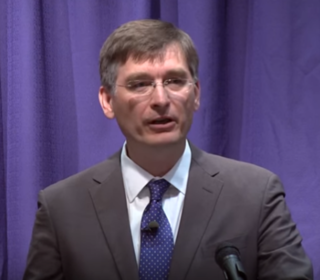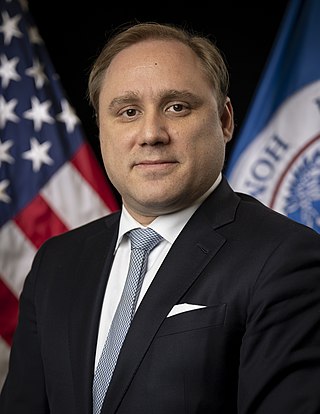
Geopolitics is the study of the effects of Earth's geography on politics and international relations. Geopolitics usually refers to countries and relations between them, it may also focus on two other kinds of states: de facto independent states with limited international recognition and relations between sub-national geopolitical entities, such as the federated states that make up a federation, confederation, or a quasi-federal system.

The Hoover Institution is an American public policy think tank which promotes personal and economic liberty, free enterprise, and limited government. While the institution is formally a unit of Stanford University, it maintains an independent board of overseers and relies on its own income and donations. It is widely described as conservative, although its directors have contested the idea that it is partisan.

The Center for Strategic and International Studies (CSIS) is an American think tank based in Washington, D.C. From its founding in 1962 until 1987, it was an affiliate of Georgetown University, initially named the Center for Strategic and International Studies of Georgetown University. The center conducts policy studies and strategic analyses of political, economic and security issues throughout the world, with a focus on issues concerning international relations, trade, technology, finance, energy and geostrategy.

A cold war is a state of conflict between nations that does not involve direct military action but is pursued primarily through economic and political actions, propaganda, acts of espionage or proxy wars waged by surrogates. This term is most commonly used to refer to the American-Soviet Cold War of 1947–1991. The surrogates are typically states that are satellites of the conflicting nations, i.e., nations allied to them or under their political influence. Opponents in a cold war will often provide economic or military aid, such as weapons, tactical support or military advisors, to lesser nations involved in conflicts with the opposing country.

The United States foreign policy toward the People's Republic of China originated during the Cold War. At that time, the U.S. had a containment policy against communist states. The leaked Pentagon Papers indicated the efforts by the U.S. to contain China through military actions undertaken in the Vietnam War. The containment policy centered around an island chain strategy. President Richard Nixon's China rapprochement signaled a shift in focus to gain leverage in containing the Soviet Union. Formal diplomatic ties between the U.S. and China were established in 1979, and with normalized trade relations since 2000, the U.S. and China have been linked by closer economic ties and more cordial relations. In his first term as U.S. president, Barack Obama said, "We want China to succeed and prosper. It's good for the United States if China continues on the path of development that it's on".

Herbert Raymond McMaster is a retired United States Army lieutenant general who served as the 25th United States National Security Advisor from 2017 to 2018. He is also known for his roles in the Gulf War, Operation Enduring Freedom, and Operation Iraqi Freedom.

Anthony H. Cordesman was an American national security analyst. He held the Arleigh A. Burke Chair in Strategy at the Center for Strategic and International Studies (CSIS) and was a national security analyst on a number of global conflicts.
Seth G. Jones is an American academic, political scientist, author, and former senior official in the U.S. Department of Defense. Jones is most known for his work on defense strategy, the defense industrial base, irregular warfare, and counter-terrrorism. Much of his published work and media interviews are on defense strategy; Chinese, Russian, and Iranian conventional and irregular capabilities and actions; and terrorist and insurgent groups such as al-Qaeda and the Islamic State. He is currently a senior vice president at the Center for Strategic and International Studies.

Jakub J. Grygiel is an Ordinary Professor of politics at the Catholic University of America and fellow at The Institute for Human Ecology. He is a senior advisor at The Marathon Initiative and a Visiting National Security Fellow at the Hoover Institution. He is also a book review editor for Orbis. In 2017-2018 he was a senior advisor to the Secretary of State in the Office of Policy Planning working on European affairs. Before joining the Department of State, he was George H. W. Bush Associate Professor at The Paul H. Nitze School of Advanced International Studies. Grygiel was a Senior Fellow at the Center for European Policy Analysis.

Kori N. Schake is an American international relations scholar currently serving as Director of Foreign and Defense Policy at the American Enterprise Institute. She has held several high-level positions in the U.S. Defense and State Departments and on the National Security Council. She was a foreign policy adviser to the McCain-Palin 2008 presidential campaign. Schake is a contributing writer at The Atlantic. She serves on the board of advisors of Foreign Policy Research Institute and the Alexander Hamilton Society. Schake is a member of the Defense Policy Board Advisory Committee.

Antony John Blinken is an American lawyer and diplomat currently serving as the 71st United States secretary of state. He previously served as deputy national security advisor from 2013 to 2015 and deputy secretary of state from 2015 to 2017 under President Barack Obama. Blinken was previously national security advisor to then–Vice President Joe Biden from 2009 to 2013.

Dmitri Alperovitch is an American think-tank founder, author, philanthropist, podcast host and former computer security industry executive. He is the chairman of Silverado Policy Accelerator, a geopolitics think-tank in Washington, D.C., and a co-founder and former chief technology officer of CrowdStrike. Alperovitch is a naturalized U.S. citizen born in Russia who came to the United States in 1994 with his family.

Jacob Jeremiah Sullivan is an American attorney serving since 2021 as the U.S. National Security Advisor.

Dr Fiona Hill is an Anglo-American academic, foreign affairs advisor and author, who since 2023 serves as Chancellor of Durham University.

Matthew Forbes Pottinger is an American former journalist and U.S. Marine Corps officer who served as the United States deputy national security advisor from September 22, 2019 to January 7, 2021. Previously Asia director on the National Security Council since 2017, his tenure was unusual among senior aides serving under President Trump for its length, given an administration marked by high turnover. Pottinger worked to develop the Trump administration's policies towards China.

Michael George Glen Waltz is an American politician, businessman, author, and colonel in the United States Army who has served as the U.S. representative for Florida's 6th congressional district since 2019. He is a member of the Republican Party and is the first "Green Beret" to be elected to the United States Congress.
The semiconductor industry, including Integrated Circuit (IC) manufacturing, design, and packaging, forms a major part of Taiwan's IT industry. Due to its strong capabilities in OEM wafer manufacturing and a complete industry supply chain, Taiwan has been able to distinguish itself as a leading microchip manufacturer and dominate the global marketplace. Taiwan’s semiconductor sector accounted for US$115 billion, around 20 percent of the global semiconductor industry. In sectors such as foundry operations, Taiwanese companies account for 50 percent of the world market, with Taiwan Semiconductor Manufacturing Company (TSMC) the biggest player in the foundry market.

Kathleen Anne Holland Hicks is an American civil servant who has served as the United States deputy secretary of defense since 2021. She is the first Senate-confirmed woman in this role and is the highest ranking woman to have served in the United States Department of Defense.

The Artificial Intelligence Cold War (AI Cold War) is a narrative in which geopolitical tensions between the United States of America (USA), the Russian Federation, and the People's Republic of China (PRC) lead to a Second Cold War waged in the area of artificial intelligence technology rather than in the areas of nuclear capabilities or ideology. The context of the AI Cold War narrative is the AI arms race, which involves a build-up of military capabilities using AI technology by the US and China and the usage of increasingly advanced semiconductors which power those capabilities.

Oriana Skylar Mastro is an American political scientist and author. She is a Center Fellow at the Freeman Spogli Institute for International Studies and assistant professor of Political Science at Stanford University. She is also a non-resident senior fellow at the American Enterprise Institute and a strategic planner at the US Indo-Pacific Command. Her research focuses on Asia-Pacific security.

















